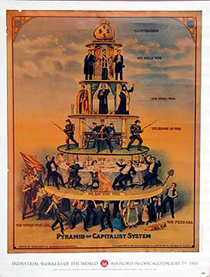Thomas Ricks: Consistently Intelligent Discussions on the War Over the Iraq War
In a democracy, politics should inform and shape the approach to war -- especially the decision to go to war.
Today's online live chat with Thomas Ricks of the Washington Post, The War Over the War, included some especially thoughtful questions and informative responses, including these clips:
- The argument I heard yesterday from the former regime elements and dead-enders at the American Enterprise Institute was that the benchmarks laid down by President Bush in January when he announced the new U.S. approach are irrelevant. But, I thought, the benchmarks were the selling point for the new approach. It is as if a salesman sold you a car by telling you it would get 150 miles to the gallon and also go 150 mph--but that you need to wait six or nine months for that to start happening. When you wait that amount of time, find it doesn't happen, and go back and tell him, he says, "Well, you really don't need to go that fast, do you? And also you might start getting that mileage next year--you just need to show more patience."
The bottom line is that security is apparently improving in parts of Baghdad, but that more U.S. troops are getting killed, and that the strategic purpose of the troop increase was to create a breathing space in which Iraqi leaders could find their way to political reconciliation--and there is little if any sign of that goal being realized.
- ..."tactics" and "strategies" are not the same thing ... [what's the difference?] "Tactics are what you do at the moment, or day to day, to achieve a larger goal. Strategy is about determining what that larger goal is, and what resources and means you will use to achieve it.
Essentially, as TE Lawrence said, tactics are the steps on the stairway; strategy is the stairway itself.
Keep in mind also this rule: Good strategy will fix bad (or inappropriate) tactics. But good tactics can't fix a bad strategy--which is where we were in Iraq for a few years after 2003."
- The right [question] may be, is the United States making more friends than enemies?
- Iraq may have solved more problems for al Qaeda than it created.
- This year I find myself thinking, Here we go again.
- ...it would be very difficult to maintain current U.S. troop levels beyond March 2008. So one way or another we are going to watch [the Iraqis] sort it out.
- it is almost certainly true that we will start to draw down troops next year. But a drawdown ain't the same as a withdrawal.
I think the distinction between "politics" and fighting a war is a false one. In a democracy, politics should inform and shape the approach to war -- and especially the decision to go to war. As Clemenceau (I think) said, war is too important to be left to the generals.
- One of the many ironies here is that it probably would be easier for the US govt to deal with Iran if we didn't have troops in Iraq.
- I am always struck that American society doesn't seem much aware of the war as it goes about its daily business.
- ...no one in Iraq really seems to share our goals.
- The support for the war is gone and it is not coming back -- regardless if we have the best strategy and supporting tactics in place. The American public is fed-up with this mess and it is simply too late to recover. ... [Yet, that] doesn't mean the war is over.
Labels: failure in Iraq, iraq war, Thomas Ricks, war, washington post, WashingtonPost chat







0 Comments:
Post a Comment
<< Home